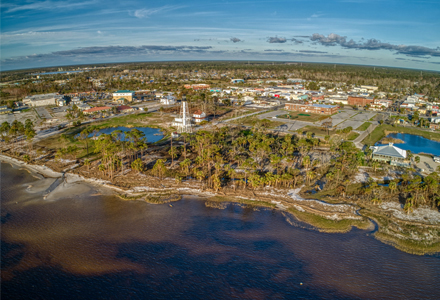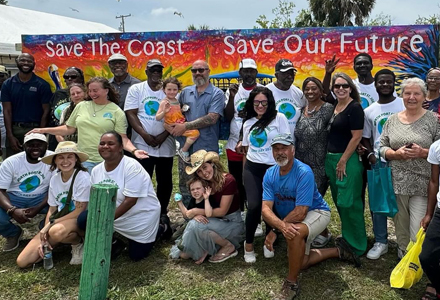By Dakota Galvin, USF College of Arts and Sciences
In Port St. Joe, a small coastal town in North Florida, residents rallied against
a 2022 proposal for a liquefied natural gas (LNG) site. The area, already burdened
by contamination from its days as a paper mill, faced heightened environmental risks
and public health concerns, sparking widespread opposition among its residents. Though
plans for the LNG site were eventually paused, the proposal became a catalyst for
collective action and community mobilization.
At the heart of this movement is Abby Vidmar, a PhD candidate in the Department of Anthropology at USF. Her research examines grassroots organizing in real time, reflecting her belief that anthropology is not just academic — but a practical tool for amplifying community voices and driving meaningful change.
“Port St. Joe is at the crossroads of global issues like climate change, environmental justice and energy transitions,” Vidmar explained.

Port St. Joe is a small town in the Florida panhandle -- nearly a six-hour drive from Tampa. (Photo courtesy of Adobe)
Vidmar’s work is set against a backdrop of compounded challenges facing Port St. Joe. In 2018, Hurricane Milton devastated the town, leaving widespread destruction that many residents are still recovering from. Previous hardships include the 1998 closure of the paper mill, which brought economic struggles and left contamination in the soil and groundwater.
Amid these challenges, the 2022 LNG proposal ignited a powerful wave of grassroots organizing. Residents and activists banded together, using social media, local press, petitions and public meetings to oppose the facility and raise awareness of the risks. Vidmar’s research explores this unfolding history, documenting the strategies and dynamics of mobilization as they evolved, as well as exploring the recent grassroots organizing in the context of the history of the community.
“My research seeks to understand how perceived immediate threats trigger high levels of community engagement and lead to informal governance structures stepping in where formal systems may fall short,” Vidmar said.
While the pause in LNG plans caused a decline in activist engagement, Vidmar emphasizes the significance of their organizing efforts.
“The strategies used by this grassroots coalition are inspiring for other Gulf Coast communities facing LNG siting and expansion,” she noted. “The most surprising part of my research has been how quickly mobilization efforts thrived — especially witnessing people who had never worked together before come together, united by their shared concern for the threat facing their community."
Vidmar’s work highlights the ebbs and flows of grassroots activism, offering insights into the resilience of small communities navigating environmental and economic uncertainty. Her research serves as both a record of the community’s fight and a guide for other movements seeking meaningful change.
“I hope communities on the Gulf Coast confronting LNG siting and expansion can find inspiration, insight and solidarity in the people and the story of what happened in Port St. Joe. I also hope for policymakers at the local and national level be informed and understand the contradictions within environmental justice and energy transition initiatives and the impacts on everyday lives and livelihoods of residents,” Vidmar said.

Vidmar (center) working with Port St. Joe community leaders discussing future action plans in the area. (Photo courtesy of Abby Vidmar)

Port St. Joe community rallies for Earth Day to celebrate the pausing of the LNG facility. (Photo courtesy of Abby Vidmar)
Although Vidmar is set to graduate in 2026, her work is far from over. She hopes to apply her findings and create a digital storybook allowing residents’ stories and experiences be shared in a nontraditional, multimedia collaborative format — documenting lived experiences to pass on to future generations.
“My hope is for Port St. Joe area residents to use the storybook to share and build awareness of their story with other Gulf Coast communities, funding agencies, policymakers, and other activists for generations to come,” she said.
“I hope my research will inspire others to produce creative products of environmental justice-centered work, to reach audiences and activists beyond academia.”
Reflecting on her journey, Vidmar acknowledges the profound impact her research has had on her perspective.
“My research has increased my wariness about the future of the planet, while also instilling hope. I am inspired by the people and organizations I collaborate with through witnessing and experiencing radical acts of kindness, care and tenacious enthusiasm in the fight for the protection of the health and wellbeing of their community and the greater world.”
Video by Corey Lepak.
